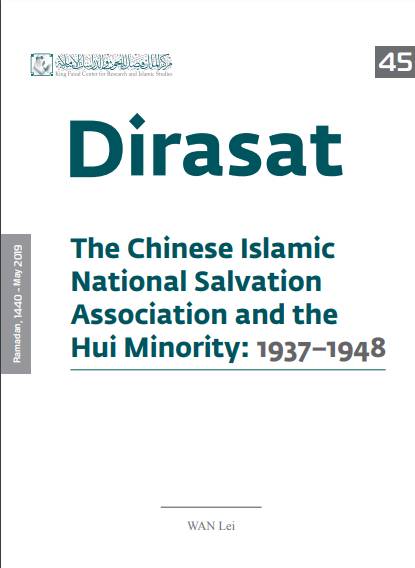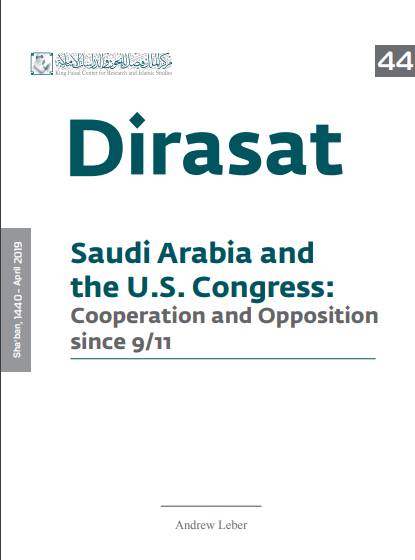Dirasat (KFCRIS Papers)

Number: 45
Author: WAN Lei
The Hui in China is a singular ethnic group. They speak Chinese but appear to have pursued a uniquely cultural evolution following immigration of its main grouping into China during the Mongol Yuan dynasty nearly eight centuries ago. But Hui societies only became evident in the first half of the 20th century, symbolizing Hui in–group consciousness; a nationwide semi–official China Huijiao [Islamic] Nation–Salvation Association was the national organization that played a significant part in uniting the Hui minority to support the Second Sino–Japanese War (The Resistance War against Japan) and in protecting the Hui minority in man

Number: 44
Author: Andrew Leber
This Dirasat seeks to understand the present opposition in Congress and especially the Senate. First, it explains the indirect role that Congress can play in U.S. foreign policy, while highlighting the potential role of partisan polarization in U.S. foreign policy. Next, it provides context for the U.S.-Saudi relationship in Congress by examining past congressional actions with respect to the Kingdom. Finally, it examines congressional activity since the death of Jamal Khashoggi, focusing in particular on the coalition of senators that has formed to advance legislation critical of the Kingdom.
&nbs
Number: 42
Author: Abdullah bin Khaled Al Saud
In early 2016, an enormous amount of classified documents related to ISIS foreign terrorist fighters were leaked. It was later acquired by a limited number of media and academic institutions, including the International Center for the Study of Extremism at King's College London, where I spent a year and a half working as a visiting research fellow. This report examines deeply these leaked documents, with particular emphasis on citizens and residents came from Saudi Arabia.
The English translation of this study is currently not available.
Number: 41
Author: Mitchell Belfer - Khalid Alshaikh
The 1979 Iranian revolution continues to reverberate throughout the Middle East. While many of the more pronounced Iranian proxies, such as Lebanese Hezbollah and the Houthi militia in Yemen, are the focus of a wide assortment of terror-state explorations, it is important to look at some of the other organizations that Tehran utilizes in pursuit of its regional and international interests. Bahrain, has long been of a strategic interest to the Islamic Republic as it regards it as its Fourteenth Province and a stepping stone to a more direct confrontation with Saudi Arabia. The Iranian Revolutionary Guard Corp prioritizes operations against Bahrain, for
Number: 40
Author: Sarah Alotaibi
This study aims to describe the status of the renewable energy sector in the Kingdom of Saudi Arabia and its development stages, by presenting the course of government's development policies in supporting and encouraging the spread of renewable energy uses since previous years until today. The study also tries to monitor the reality of the changes and challenges faced by this sector, and its impact on the restructuring of the sector, and some other relevant entities.
In the second part, the study reviews the strategy of strengthening local content and policies to support local industries and export development. The study is also based, in its policies ana
Number: 39
Author:
Habib Al-Badawi
At the beginning of the 21st century, Japan adopted a new approach toward the international community and called it the "Indian-Pacific Ocean Strategy, Free and Open Area" as a geostrategic concept to strengthen its leading global position through the establishment of an international network of relations, allowing free and smooth flow of the elements of the capitalist system, human and economic, with a hidden objective to curb the Chinese dragon.
The English translation of this study is currently not available
Number: 38
Author:
Mohammed Aldujayn
This study aims at investigating Saudi tourist phenomenon’s contributions/impacts to/on the tourism industry in Turkey. Additionally, it provides more focus on Trabzon and draw examples and reasons, being it one of the most visited city for people in Saudi Arabia. It explains Saudi phenomenon, how it developed and how it can contribute economically, culturally and socially to Turkey’s tourism industry and specially the city of Trabzon. This report aims at answering the following questions; how Saudi tourists’ phenomenon’s appearance impacts Turkey&rsquo
Number: 37
Author:
Mona Alami
The Iraqi Popular Mobilization Units has recently completed its transformation from a loose coalition of militant group groups to a semi state actor, entrenched in Iraqi state institutions thanks to the large victory of a number of its leaders in the recent Iraqi elections under the label of the Fateh Coalition. The PMU emerged in 2014, when it conglomerated a number of substate armed groups under the banner of the Hashd al-Shaabi at the behest of then prime minister, Nouri Malikial-Maliki and after a call by the country’s highest Shiite cleric, Ayatollah Ali Sistani, to fight the e
Number: 36
Author:
Author:
Dr. Jack Caravelli
Co-Author:
Sebastian Maier
Brief statement
By US President Donald Trump’s recent decision to pull out of the Iran nuclear deal as well as by engaging with North Korea’s supreme leader Kim Jong-un, the Trump administration has decided to embark on a set of issues fraught with both o
